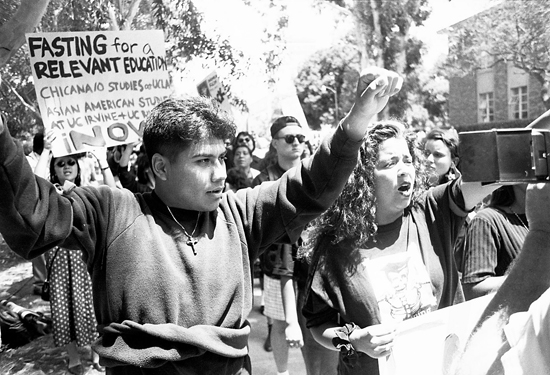Today is César Chávez Day, a holiday created to celebrate the life
of the California labor-rights activist and to highlight Chicano
culture.
Chávez, the founder of the United Farm Workers, was influential in the organized labor-union movement. He pursued his mission through nonviolent tactics such as organizing boycotts and fasting to bring public attention to his cause.
“He’s as relevant now as when he was alive because Los Angeles and the United States is (currently) undergoing a transformation in priorities, refocusing on issues of poverty, inequality and workers. … (There is a) groundswell of support regarding workers trying improve their lives and their household so their children can realize the American dream,” said Abel Valenzuela, a professor at the César E. Chávez Department of Chicana and Chicano Studies.
While teaching at UCLA, Valenzuela said he also noticed a growing awareness on campus of Chicano affairs. He credits this awareness to the expanding numbers of academic, cultural and artistic events highlighting the culture.
Valenzuela pointed to opportunities on campus for students to discover the issue, such as the UCLA Chicano Studies Research Center, cultural and artistic events, classes offered in the department and increased diversity and avenues for expression as signs of promoting the culture’s vitality.
The Chicano Studies Research Center was created in 1969 as a result of the demands of students, faculty and staff. Students were frustrated that they couldn’t find enough information about the Chicano experience and culture in the available campus libraries, said Lizette Guerra, the acting librarian of the Chicano Studies Research Center Library.
The center participates in and supports the accumulation, dissemination and archiving of multidisciplinary research pertaining to Chicano Studies, said Carlos Manuel Haro, the former assistant director of the center. The center is unique in that it has its own publishing arm, Aztlán, a journal of Chicano studies.
Students can utilize the center by being employed at the office or for research projects, applying for research grants and using the library, said Francisco Iribarren, the current assistant director of the center.
The center aims to disseminate and pursue knowledge of the Chicano culture and establish a meaningful connection between the university and the community, Iribarren said. Its overall goal is to create a positive impact on the community on levels ranging from education to public policy.
An interdepartmental program in Chicano studies was established in 1973, but it wasn’t until 1993 that the program was granted department status. In 2007, the department was renamed the UCLA César E. Chávez Department of Chicana and Chicano Studies.
To reflect the growing diversity on campus, the UCLA Office of Residential Life launched a pilot run of the Chicano/Chicana Latino/Latina Studies Theme Community at Sproul 2 South last year.
The goal of the floor is to bring a greater understanding of Chicano issues and an appreciation of the culture, said Ed Baltierrez, a resident assistant on the floor.
This Saturday, about 20 residents on the floor will go on a tour with the border patrol to assess the political aspects surrounding how the immigration debate is affecting those migrating into the country from Mexico.
Baltierrez plans to have a follow-up discussion with his floor on the reasons why immigrants make the trip north and what it’s like for a Mexican immigrant to cross the border. He hopes to tie in the struggle of present-day low-wage workers with the movement for which Chávez fought.
“Everyone needs someone to push society to get change. You can’t just sit around. Chávez understood people in this workforce deserve to be well-paid to live comfortably,” Baltierrez said.
He said that only eight states in the United States, including California, recognize César Chávez Day, but he hopes it will spread to all 50 states.
